Politics
Appeal to youth: Don’t irrationally fear booster shot

by Dr. Nadisha Badanasinghe,
Senior Lecturer and Specialist in Microbiology Faculty of Medicine, University of Kelaniya
COVID-19 has been the most dreadful pandemic that hit the world recently and people everywhere are still suffering from it. But in Sri Lanka there’s been a considerable decrease in infection in the past few months since 80% – 90% of the population had taken the first and second dose of the vaccine.
Nevertheless, there is a need for a third (booster) dose since the period of protection from the first two doses is waning now. We see a sharp rise in the spread of the disease due to many reasons; people being reluctant to take the booster, the country being fully opened, a big increase in public gatherings, and the ability of the Omicron variant to spread very fast.
The cause for COVID-19 is a virus named SARS-Cov-2. This pandemic, which was first recognized in December 2019 has been spreading with different variants ever since. As of now, around 400 million COVID infected cases are reported globally and the death toll is more than 5.7 million. Even at this moment, about two million COVID infected cases are reported for a day.
The Sri Lanka picture is that over 600,000 infected cases have been reported and more than 15,000 people have died from the infection. Currently, there are just above 1,000 infections reported here daily, but the true incidence is very much higher. Even though it’s now two years since COVID-19 virus erupted, a decrease in the spread of the disease by only adhering to safety measures like washing hands and wearing masks cannot be seen.
That is why the populations should have vaccine-induced immunity as the most effective and consistent protective measure. Vaccination campaigns in Sri Lanka are among the best in the world. It is satisfactory that around 95% of eligible people have taken the first dose and 80% the second dose. However, it can be seen that there is an irrational fear in society about the booster dose.
As of now, only around 5.9 million people (less than 50%) have taken the third dose. This is a tragic situation perhaps mainly due to the lack of awareness of how vaccines work and delusions in society.
We should have a thorough understanding as to why we should be vaccinated. We will get a good immune response after completing the second dose. Full immunity is not gained only after the first dose; therefore, the second dose must also be taken to complete the primary course. Although we get about 90% immunity after the completion of the two doses, this protection is temporary.
According to scientific research, Covishield and, Pfizer will give six months immunity following the second dose, while Sinopharm covers about a three-month period. However, this 90% immunity is reduced to 40% after six months. When the immunity drops, then there is a possibility of being infected.
That is why the booster is given as immunity drops after the primary course. The booster at the right time will not only increase immunity that had dropped after six months but also protect for a considerably longer time. In other words, the booster is capable of increasing the immunity to a higher level and holding it for a considerably longer time.
Usually we get two types of vaccines from birth: “live attenuated and killed”. The live vaccines provide us the maximum immunity in which the particles of virus in the vaccine replicate in our cells. The vaccines given to us in infancy for chicken pox and measles are examples of the live vaccines and they rarely need frequent boosters. On the other hand, the killed vaccines do not have the ability to replicate in the body. Therefore, boosters should be given from time to time to top up their immune response. Examples of killed vaccines are tetanus, diphtheria and hepatitis B for which several boosters are given during infancy.
All the COVID-19 vaccines are ‘killed vaccines’ so they cannot replicate in our body. That is why it is necessary to take several doses or boosters for COVID-19 protection. There is a possibility that another dose after the third would also be needed in the future if the disease continues to spread since the immune protection from killed vaccines is not long-lasting.
Through vaccination our body recovers from infections by preparing and training our immune system to fight infectious agents (pathogens). The immune system identifies the pathogens and kills them. Moreover, it can remember pathogens and destroy them in case we are exposed to them later. This feature of our immune system is called “memory” and it is the basis for vaccination. The vaccines consist of the particles of the pathogens (attenuated virus and bacteria). Our immunity system recognizes these particles and produces an immune reaction with a memory response. When we are exposed to the real pathogen, the memory response kicks in and kills the pathogen.
The Omicron variant is spreading rapidly these days replacing the Delta variant. When the viruses spread so fast and multiplies rapidly, they are capable of getting genetic mutations and producing different variants. Another advantage of vaccination is that it reduces the transmission and multiplication of the virus and control the formation of different variants.
The Omicron variant was found in an African country. Vaccination does not happen at the same pace in all countries and vaccination is slow in Africa creating conditions for new variants to surface. Fortunately, our vaccination programs operate very successfully compared to other developing countries with such programs conducted even at the regional level covering the whole population of the country.
Medical Officers of Health, Public Health Officers and midwives are committed to this process. We should therefore do our duty, get vaccinated and help to continue this process successfully. We could continue our daily activities and build our economy only if we stay healthy.
It is seen that the youth are reluctant to take the booster. The main reason for this is the confidence that they have a good immunity. It is true that young people without other diseases have good immunity. But there have been cases where infected youth had complications, needed ICU treatment and even died. The good news is that young people who are vaccinated will generate a very effective immune response compared to the elderly.
There are other reasons too why the youth should ensure vaccination; they are the group who are mostly exposed to the risk as they have to continue their higher- education, employment etc. Once they are home, they are in contact with the elderly and small children who are not yet vaccinated and who are at risk of complications. Hence, it is the responsibility of youth to get vaccinated, protecting themselves and ensuring the safety of their family and society by curbing the transmission of the virus among the vulnerable.
If vaccination was not properly conducted and the country was continuously at a standstill in this regards, it is again the youth that would have been most severely affected. The universities have been closed for a considerable period and some may have lost jobs due to the shutdown of industry and tourism. Young people must continue their education physically, and the youth should give their support for the vaccination programs to reenergize industry and tourism.
Some young people also wrongly believe the vaccine may have harmful effects on their health. These vaccines are approved after they are scientifically tested and their their safety established. There is no truth that the vaccine causes sterility in both sexes with research proving there is no such impact.
Priority is given to pregnant women in the vaccination process as they are at greater risk if infected. Pregnant women have died of Coronavirus in past COVID-19 waves. Some people are wary of directing the elderly for vaccination fearing complications. Since, the elderly develop a comparatively low immune response, it could be seen that they have lesser side effects than others. Therefore vaccinating them is urgent as they are the most vulnerable group risking complications from the disease.
Suspecting mutation of our genes or DNA being caused by the vaccine is another delusion worrying people. No COVID-19 vaccine carries such risk to DNA or genes. Pfizer consists of only mRNA, and it does not consist of DNA or genes. Therefore, there is no impact on our DNA or genes. The mRNA only codes for a signal to produce virus proteins in our body to which our immune response is directed. Immunity in our body is produced by means of antibodies against these virus proteins. As soon as this purpose is served, the vaccine components are removed from our body.
Only the antibodies which are produced by our body against such viruses remain. The side effects like pain in the injected area in the arm, body pain and fever are caused during the immunity making period. Since the vaccine is injected to the muscles, muscle pain can be there for a couple of days. It is also important that infected patients take the vaccine after recovery as it has been proven by research that they get a high immunity once it is taken after infection. People who are vaccinated will not get severe disease or complications even if they are tested positive. It is clear that those who had died or had severe complications, have not been properly vaccinated.
It is the Pfizer vaccine which was continuously given in most European countries and in America. Hence, most of the research on it regarding its safety and efficacy was conducted in such countries. It was assured that this vaccine is completely safe and effective. However, we received the Pfizer vaccine quite late, although some people demanded it from the very beginning. Now, the necessary quantity of vaccines has been received. Therefore, it is wise to get vaccinated now when it is available.
As of now, the spread of Omicron variant has taken a terrible turn. Nevertheless, we still see patients with mild to moderate symptoms probably because they have already had their primary course of vaccine. The Pfizer vaccine provides an effective immune response to Omicron and other variants of the Coronavirus.
The youth in the country bears a special responsibility in COVID vaccination program. They should lead by example by getting the booster as soon as possible and protect themselves and others around them. Also, they have a great responsibility to make others aware of the facts by organizing awareness campaigns through social media and mass media. All the scientific evidences regarding vaccines are readily available on the well-recognized websites on the internet.
Therefore, as knowledgeable, and responsible citizens they should not be involved in the dissemination of negative and false information regarding the vaccines through social media. Youth can serve best as responsible citizen by getting vaccinated and by making others aware of the need for vccination.
Features
Return to Normalcy: After Rajapaksa Kakistocracy and Supercilious Ranilocracy
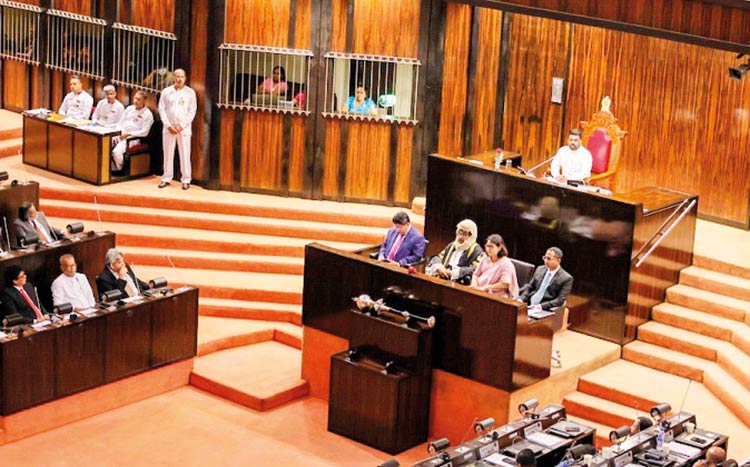
by Rajan Philips
A word first used in 17th century England is gaining new currency in 21st century America. Kakistocracy, a Greek derivative per usual, means government administered by the worst group of citizens – in qualification, competence, experience and scruples. Kakistocracy is in full display in the US with the election of Donald Trump as president for a second term. America is returning to chaos not heeding Kamala Harris’s warning against going back.
In Sri Lanka, Rajapaksas epitomized Kakistocracy for nearly two decades before it imploded under Gotabaya Rajapaksa. After them came Ranil Wickremesinghe to clean up the economic mess left behind by the Rajapaksas. To his credit, Mr. Wickremesinghe did clean up the economic mess. But he also created a political mess, characteristically and superciliously
The mess that Ranil made, heaped atop the mess that has been piling up for all the years of this century finally became insurmountable for the entire political establishment comprising the UNP, the SLFP, and their offshoots, the SJB and the SLPP. They have been sent packing by the people, unsung, unwept and unhonoured. There is an SJB rump but without a winning leader.
Sri Lankans have turned the page and opened a new chapter. There is a new president, a new parliament and a new cabinet. There is both the return to old normalcy, as well as the beginning of a new normal. The end cannot be taken for granted, but there could not have been a better start for the making of a new nation.
Politics is nothing but constant work in progress. No government can deliver on everything that is possible. The best any government can do is to maximize the good that is possible and minimize the bad that is avoidable. And achieve within its term durable benefits for the people. There is enough reason to be optimistic about the new government while being alert to the risks – that are also aplenty – of its straying off course.
There is already an indication of straying in the elephantine omission of any reference to the future of the executive presidency or the enactment of a new constitution in an otherwise well crafted and comprehensive inaugural Policy Statement by President Anura Kumara Dissanayake at the opening sitting of the new parliament on Thursday.
I read the English version of the speech issued by the President’s Media Division, and even ran the ‘word find’, looking for words like – constitution, executive, president, referendum – and found none of them, let alone abolition! There is one reference to ‘provincial councils’ but that is also in connection with the role they could play in ‘cleaning Sri Lanka’. There is also no mention if and when local government and provincial council elections will be held. I don’t think these omissions are a result of translation from Sinhala to English.
And they will be viewed as grave omissions by NPP critics considering the pillorying that was given to Ranil Wickremesinghe over elections and their postponements. Already there have been criticisms over the government’s walking back on the promise to repeal the Prevention of Terrorism Act. At least the government issued a statement indicating its position on the PTA matter.
But omitting any reference to a new constitution or the executive presidency in the Policy Statement flies in the face of the government’s insistence on being transparent and accountable. NPP’s many critics will justifiably view this omission as a sign that the new government is not going be any different from its predecessors in making and breaking promises to abolish the executive presidency. Unless the government has other plans, and we are not privy to it. Otherwise, this will be a part of the old normal.
The omission is also unfortunate in that it diminishes the government’s impressive achievements in setting up its first cabinet and in outlining its policy framework in the President’s well thought out statement to parliament. The new president, parliament, the new cabinet and the President’s Policy Statement are also indicative of the sociology of the JVP’s metamorphosis into NPP and the roots of their political success.
A New Beginning
It could easily be said that the NPP cabinet is the most compact and competent cabinet of ministers to be assembled in Sri Lanka in the 21st century. Unlike other presidents this century, President AKD has restricted his portfolios to three: Defence, Finance and Planning & Digital Economy. This is more in line with President JRJ’s portfolios that closely resembled the Prime Minister’s portfolios during the parliamentary system of government. This is moving away from the practice of presidents assigning themselves too many portfolios that began with President Kumaratunga.
However, in keeping Finance under his wings, the President is continuing the practice that was also started by President Kumaratunga in 1994. Finance deserves to be a single portfolio of a single cabinet minister without any other occupational distractions. That is why Professor Mick Moore, who called Sri Lanka’s economic crisis under Gotabaya Rajapaksa, “a man-made problem”, subsequently advocated that Sri Lanka should get back to the old-style finance minister carrying only the finance portfolio.
The identification of portfolios and the selection of individual ministers would appear to be based on considerations of ability, political and/or professional experience, and electoral results. Nine of the cabinet ministers led the vote tallies in their respective electoral districts, and include mostly old JVPers and new NPPers. Seven of the ministers are those who came second or third in their electoral districts. The elected MPs in the cabinet reflect the JVP/NPP’s geographical sweep and its sociopolitical roots in the electoral districts in seven of the island’s nine provinces.
Six of the cabinet ministers are drawn from the NPP’s 18 National List MPs, which is a high proportion that indicates the need for balancing electoral representation with cabinet competence. Two of the National List cabinet ministers, Bimal Ratnayake and Ramalingam Chandrasekar have been credited for their political work in the Jaffna District that led to the NPP’s electoral success in the district. Mr. Ratnayake is a seasoned JVP parliamentarian, while Mr. Chandrasekar is a new MP and also the Minister of Fisheries and Aquatic & Oceanic Resources.
Chandrasekar with Saroja Paulraj, who was elected from Matara and is the new Minister of Women’s and Children’s Affairs, are both from the Malayaha Tamil community. The two ministers seem to be part of a new turn in cabinet making that privileges not ethnic representation but political participation. That would be consistent with the vision of an equal, inclusive and ‘non-racial’ Sri Lankan society that President Dissanayake eloquently articulated in his Policy Statement. But until that Eldorado is reached the government has to deal with misgivings about missing Muslim and Sri Lankan Tamil representation in the cabinet.
Features
The NPP’s ascent and the Opposition’s descent in Sri Lanka
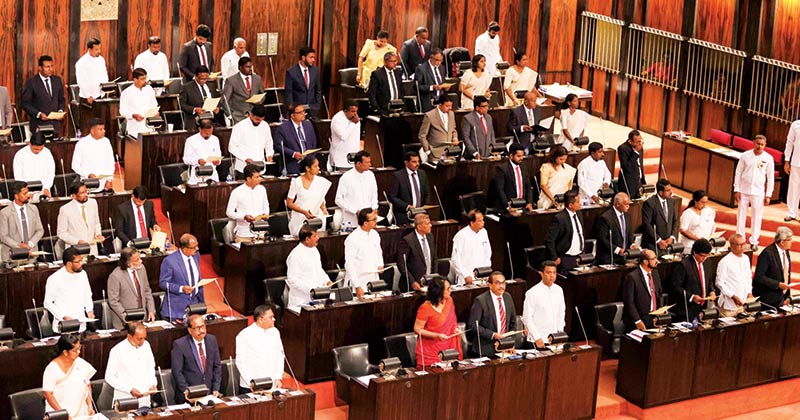
By Uditha Devapriya
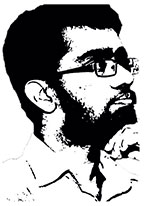 At parliamentary elections in Sri Lanka last week, the centre-left National People’s Power (NPP) checked all lists and squared all circles, winning not just traditional seats but also polling divisions populated by minority communities.
At parliamentary elections in Sri Lanka last week, the centre-left National People’s Power (NPP) checked all lists and squared all circles, winning not just traditional seats but also polling divisions populated by minority communities.
Speaking to the media on Friday, November 15, hours after general election results were announced in Sri Lanka, Tilvin Silva, General Secretary of the Janatha Vimukthi Peramuna (JVP), the dominant member in the National People’s Power (NPP) alliance that governs the country, acknowledged that his party would commit to “developing the country, eradicating corruption, and enhancing democracy with accountability.”
Silva’s remarks came in the backdrop of one of the biggest electoral landslides in the island’s political history: the NPP, reduced to three seats at the 2020 general election, gained a two-thirds majority, obtaining 159 seats and 61 percent of the vote, last week.
The achievement is all the more remarkable considering that the NPP secured a two-thirds majority without entering agreements with other parties. It also trumped expectations by winning seats in minority populated areas like the Northern Province, which had been written off as unfeasible and unwinnable for a party associated, rightly or wrongly, with Sinhala Buddhist nationalist politics. Yet by the early hours of Friday, November 15, it was clear not only that the NPP had won these areas but that they had displaced traditional communal parties: in the Tamil-dominated Jaffna district, for instance, the alliance secured three seats, while the once powerful Ilankai Tamil Arasu Kachchi (ITAK) obtained just one.
The NPP’s victory is also remarkable given that, at presidential elections two months ago, the party won with 43 percent of the vote. This led commentators, including supporters of the previous Ranil Wickremesinghe administration and the main Opposition, the Samagi Jana Balavegaya (SJB), to brand the new president, Anura Kumara Dissanayake, as a minority leader. At a rally, former President Wickremesinghe, who was appointed as president by parliament instead of a popular vote in 2022, compared himself to Dissanayake, stating that both were elected as presidents without majorities. As a former State Minister posted on Twitter on Friday, however, the results have made “a nonsense of the claims made about the President being a minority president.”
A record of Opposition parties
If supporters of the NPP were flushed with victory, they were fairly subdued in expressing their feelings. In Sri Lanka, the announcement of election results is typically followed by firecrackers and much celebration on the streets. On Friday morning – a Poya day, a religious holiday for Buddhists across the island – there was no such revelry. As the results came in, however, it was clear not only that the NPP had won, but that Opposition parties, including both those positioning themselves as moderate (such as the SJB) and hardline (such as the Sarvajana Balaya, or SB), had lost heavily. The SJB, for instance, which obtained 54 seats at the 2020 parliamentary election, slid down to 40 this time around.
For many Sri Lankans, there were other reasons to celebrate. The NPP rose through the ranks promising both change and a cleanup of the political system. Before the general election, a number of MPs associated with the previous government opted out of the race, choosing to retire from politics or return to other professions.
Yet a few among them chose to remain and fight – and lost heavily. Former President Ranil Wickremesinghe’s coalition, the National Democratic Front, secured three seats, while the much-hyped Sarvajana Balaya, led by a powerful media mogul, failed to obtain any. The Sri Lanka Podujana Peramuna (SLPP), led until 2022 by the ousted former president Gotabaya Rajapaksa, won two: Rajapaksa’s nephew and Mahinda’s son, Namal, has entered parliament through the party’s National List. He didn’t run for an elected seat Meanwhile, the People’s Struggle Alliance (PSA), a radical alliance of university students and activists which positioned itself to the left of the NPP, did not get through. As Harindra B. Dassanayake, co-founder of Muragala, a political research think-tank in Colombo, puts it, the results show that “Sri Lankans have spoken in one voice and placed their overwhelming trust in the NPP.”
Ever since September’s presidential election, a slew of analyses has attempted to ground the NPP’s victory solely if not mainly in its commitment to anti-corruption. The Western press, by and large, has echoed these sentiments, depicting the NPP as a Marxist-Leninist outfit committed to “clean” politics. However, Ramindu Perera, a political analyst who lectures at the Open University in Colombo, argues that this mischaracterises the NPP and overlooks its political and economic programme. In an article to Factum, a foreign policy think-tank based in Colombo, he frames the NPP’s victory as “the momentous rise of the populist left.” He also states that while anger at the then government did play a role in bringing the NPP to power, this alone does not explain why it could capitalise on the post-2022 radicalisation of the country more than other parties, including those on the Left.
The SJB’s underperformance
In the run-up to both presidential and parliamentary elections, claims of the NPP being hazy, idealistic, and impractical were fervently recycled by other parties. The SJB, for instance, portrayed itself as more committed to reform, contending that the NPP did not possess enough acumen to, for instance, negotiate with the International Monetary Fund. One leading MP from the SJB called the NPP “clueless” with regard to debt restructuring, and even dismissed the arguments of a group of economists critical of the IMF agreement, who visited Sri Lanka last May, as “conspiracy” theories.
It is clear that by making such claims, the SJB only admitted that it had no original, radical reforms of its own, and that it was content in pushing forward the policies of the previous government. The IMF agreement is widely reviled, especially outside of Colombo, and is associated with the Wickremesinghe administration, which brokered it. By defending the agreement and launching attacks on the NPP, the SJB managed to diminish its electoral prospects. That several SJB MPs and relatives of MPs engaged in red-baiting the NPP, making the most spurious claims, only worsened matters. While analysts supportive of the SJB’s leader, Sajith Premadasa, argued for a course-correction, the party paid little to no attention and instead focused on denigrating the NPP on the flimsiest grounds.
The SJB was also riddled by several internal tussles, which as political and foreign policy analyst Rathindra Kuruwita argues resulted in the party not being seen as a serious political player. The election results appear to have awakened the party: some have called for an internal inquiry and even a leadership contest. As a leading political commentator, Dayan Jayatilleka, puts it, if the SJB is to recover, it needs to do away with its commitment to the previous government’s economic reforms and position itself to the left. Ramindu Perera, however, contends that this is impractical, since the SJB is committed to the policies of the Wickremesinghe government regardless of the party leadership.
The NPP’s wooing of minority voters
If the NPP proved that it could both criticise policies such as the IMF agreement at election rallies while moderating its stances after winning elections – as of now, it has stated that it will not disrupt ongoing debt restructuring negotiations – it has also thumbed its nose at critics who claimed that it could not win minority votes. The NPP’s performance in the north and east, as Harindra Dassanayake observes, indicates that it has transcended “ethnicised electoral borders.” In polling divisions like Kopay, Kankasanturai, Nallur, Point Pedro, and Vaddukoddai, the NPP won with more 20 percent of the vote, pushing establishment parties from the south and the north to second or third place.
A number of reasons, including disenchantment with and fragmentation of older parties – particularly the Ilankai Tamil Arasu Kadchi (ITAK) – can help explain this trend. ITAK’s media spokesperson, M. A. Sumanthiran, who failed to secure a seat this time, attended NPP rallies and went so far as to say that his party would work with them after elections – even though the NPP declared it would not consider building coalitions with others. Nevertheless, a few days before the election, he questioned a decision by the NPP to bring in busloads of people from districts in the Northern Province to Jaffna, traditionally an ITAK stronghold, rather than going and directly talking to them. Such criticisms did not dent the NPP’s prospects among Tamils and only served to betray ITAK’s insecurities: while the latter won 33 percent in Jaffna in 2020, it obtained a little more than 11 percent this time around.
It goes without saying that the NPP’s performance with minorities – not just in the north and east but also in the Central Province, home to the country’s Hill Country Tamil population – has come as a shock to much of Colombo’s civil society circles. While we have yet to find out what drove these voters to support the NPP in large numbers, one can argue that while issues like land ownership and justice for those who died or went missing during Sri Lanka’s 30-year separatist conflict – a conflict for which the JVP, the dominant arm of the NPP, advocated a military solution – remain relevant, Tamils feel increasingly sidelined by old parties. The election of a hardliner to the leadership of the ITAK earlier this year, ITAK’s decision to field a common Tamil presidential candidate, and the later decision to enter an alliance with the SJB, reveals this only too well.
Shifting voting patterns in the north
However, it remains to be seen whether these voting patterns reflect a broader shift in Sri Lanka’s ethnic politics. Prior to the parliamentary election, JVP General Secretary Tilvin Silva accused Tamil political leaders of failing to resolve issues like land ownership and devolution of power. He added that ordinary Tamils did not prioritise such issues and that they mainly wanted “land and water for cultivation, a price for their produce, a place to sell, a school, a hospital.” Liberal commentators have critiqued Silva’s statement, noting that despite the predominance of economic problems, Tamil people still place high value on civil and political concerns such as those which Silva seemingly dismissed.
That ITAK performed less than expected even as the NPP made such statements, however, underlies a deficit in Tamil nationalist politics – one that can be seen, as political analyst Sivashanthi Sivalingam comments, in the rise of independent groups and candidates in the northern province, especially Jaffna. Indeed, many of these candidates have taken positions more hardline than either the NPP or ITAK. The NPP’s rise, in that sense, can be traced as much to disillusionment with elite politics as to a radicalisation of elite parties – as I have noted elsewhere. In the Muslim-dominated Batticaloa district in the Eastern Province, by contrast to the ITAK, and traditional parties like the Sri Lanka Muslim Congress (SLMC), fared better, though the NPP scored majorities in other districts in the region.
According to Rathindra Kuruwita, these shifting patterns show that the north has accepted the NPP as a “serious party.” While not dismissive of civil and political issues like land ownership, he contends that they underlie more concrete economic concerns, which he says parties like ITAK have failed to deliver on. “While Tamil political bigwigs have been accepted as representatives of their people by foreign embassies and governments and Colombo-based NGOs and civil society organisations, it is clear that they have been rejected by their communities.” As one observer has argued on Twitter, the lack of analysis on why the NPP won the north and east this time, versus the slew of commentaries when it failed to win either at presidential polls in September, shows that civil society in Colombo needs to think anew and afresh – especially in relation to minority politics.
Even before 2022, the NPP managed to galvanise opposition to establishment politics. In doing so, it became a key beneficiary of the post-2022 radicalisation of the country and the youth in particular. In the two months since it assumed the country’s presidency, the party has demonstrated that it can move to the centre on a number of issues. Contrary to what supporters of the former president and the SJB state, it has shown itself capable of handling matters of state as well, though it still is going through a learning curve.
More than anything, the NPP has won the trust of communities that have almost never been associated with it. As Omar Rajaratnam, a political and foreign policy analyst in Sri Lanka specialising in defence and public diplomacy outreach, states, “for the first time in 15 years, a president from a southern party was able to enter the north without facing protests and hostility from people there.” In the context of Sri Lankan politics, this is unprecedented and cannot just be put down to the party’s opposition to corruption. The key takeaway there is clear: Sri Lanka’s minorities have helped the NPP secure their biggest mandate yet. It is now up to the NPP, and its representatives, to honour that mandate.
Uditha Devapriya is a researcher and writer from Sri Lanka who currently works as the chief analyst of International Relations at Factum, an Asia-Pacific focused think-tank based in Colombo. He can be reached at uditha@factum.lk.
A version of this article was published by The Diplomat.
Features
Netanyahu welcomes Trump’s re-election to second term

Trump’s new Ambassador to Israel: “There’s really no such thing as a Palestinian”
by Vijaya Chandrasoma
The re-election of Donald Trump to a second term of the presidency of the United States has changed the ideological trajectory of the future of the United States. At least for the foreseeable future.But it has sealed the fate of the Palestinian people in the Gaza Strip and the West Bank. Permanently.
To even consider the validity of the above statement, one must look into the constitutional, conventional and practical qualifications for the Presidency of the United States. Constitutionally, the President must be at least 35 years of age, be a natural born citizen and must have lived in the United States for at least 14 years.
Conventionally, the President stands before the Chief Justice, raises his right hand, with his left hand on the Bible, takes the constitutional Oath of Affirmation, to the effect that he/she does solemnly swear (or affirm) to faithfully execute the office of the President and preserve, protect and defend the constitution of the United States.
Swearing upon the Bible, indicating that the President is a Christian, is an option, not required by the constitution. The sixth President, John Quincy Adams took his oath on a book of law, with the intention that he was swearing on the constitution. Theodore Roosevelt and Calvin Coolidge also did not use a Bible in their oath-taking ceremonies.
In current times, however, a Presidential candidate who is not a Christian will not qualify to assume the office of the President of the United States. In fact, Donald Trump was so anxious to prove his devotion to Christianity that he took his oath on two Bibles. Perhaps as insurance against one bursting into flames during the ceremony.
There are two other practical and realistic qualifications for a candidate to qualify for the presidency. The first is that he/she must swear allegiance to the totally fraudulent interpretation of the Second Amendment, about the necessity of a “well-regulated militia, being necessary to the security of a free state, the right of the people to keep and bear arms, shall not be infringed”. A text which has been mistranslated to mean that “every citizen of 18 years of age and over in the nation has the right to bear arms, up to the maximum military lethality available, without any restriction whatsoever”.
This translation was made by the National Rifle Association (NRA), the lobby for the US military industrial complex, which controls the Republican members of the US Congress. Former Republican Chief Justice, Warren Burger once said, “The gun lobby’s interpretation of the Second Amendment is one of the greatest pieces of fraud, I repeat the word fraud, on the American people by special interest groups that I have ever seen in my lifetime”.
The second (and I apologize it took me so long to come to the qualification relevant to my original statement) is that any candidate with aspirations to the US presidency, since the end of World War II in 1945, has to swear undying fealty to the Jewish State of Israel, and provide all assistance, financial and military, to defend the Promised Land and ensure its divine sovereignty to perpetuity.
The backlash against the Biden/Harris Administration by the Arab population in the United States, especially the large concentration of Muslim and Arab-Americans in the city of Dearborn, in Michigan, one of the vital battleground states, was a major factor in Trump carrying a state that Biden won convincingly in 2020 by a margin of 2.8%. A state that was vital for his re-election.
Michigan had been a blue (Democratic) state which had not been won by a Republican since 1988, till Trump flipped it by 0.2%, the closest margin of all states in 2016. At that time, it was felt that Clinton lost Michigan because she was too over-confident, paid little attention to personal visits and advertising and took the support of the Arab-American population for granted.
Biden learned from Clinton’s mistakes, and heavy advertising and personal visits turned out to be a winning strategy in 2020.
In November, 2024, however, Trump won Michigan, beating Vice-President Harris by 2,804,647 to 2,724,029 votes, a majority of 120,618 (1.4%) votes, mainly because of the misplaced anger of the large population of Arab-Americans, Muslims and Palestinians, currently numbering over 200,000, against the Biden administration’s continued support of Israel in their continuing massacre of Palestinian civilians, men, women and children in Gaza and the West Bank.
The Palestinians in the Gaza Strip are continuing to face the consequences of the brutal onslaught by 2,000 Hamas terrorists, who ran amok at an Israeli settlement (kibbutz) near the Israeli-Gaza border on October 7. Over 1,200 innocent civilians, men, women and children, including 71 foreign nationals were savagely butchered in a gruesome terrorist act by Hamas. Over 250 people, including 12 Americans were taken hostage; about 100 hostages are still alive, according to current Israeli estimates.
The Israelis, consumed by grief and fury, immediately went into revenge mode against the entire population of nearly two million Palestinians living in the Gaza Strip, for the despicable acts of a group of Hamas terrorists, who have their base in the Strip. The Israeli attacks have now escalated to include Palestinian settlements in the West Bank, home to 1.8 million Palestinians. Palestinians in Gaza and the West Bank live in fear of losing their homes, and their lives, at any moment during the relentless Israeli airstrikes. They live in terror, as the Jews did in Germany in the 1930s, guilty of no crime other than their ethnic identity.
On October 18, 2023, President Biden visited Israeli Prime Minister Bibi Netanyahu, embraced him, vowing that the United States will provide “rock solid” support for its strongest ally in the Middle-East to defend itself.
Which begs the questions: what is the extent of the self-defense demanded by Israelis for the October 7 massacre? How many more innocent Palestinian civilians, men, women and children, must be slaughtered, how many more billions of dollars must Americans pour in, before the Israeli thirst for revenge is entirely slaked? When will, in Israeli and American eyes, the punishment on innocent Palestinian civilians be deemed to adequately fit the October 7 crime committed by Hamas terrorists?
In other words, when will the Israeli-American aggressor achieve the compassion, the maturity, to recast the concept of vengeance into the quality of justice?
Even more simply and cynically put, what is the going conversion rate for massacred human beings, Jews to Arabs? How many killings of Palestinians will justify the loss of 1,200 Israelis butchered on October 7? Palestinian civilian deaths currently stand at 45,000+, representing nearly forty Palestinian civilians to one Israeli civilian. What is the final count that will satisfy Israeli revenge? Or are they going for a new Holocaust of 3.5 million Palestinians, representing nothing short of ethnic cleansing and genocide?
Months into the conflict, with tens of thousands of Palestinian civilians, men, women and children, murdered, and hundreds of thousands displaced and homeless, the Biden Harris administration has continued to support the Israeli’s right to self-defense, providing military and financial assistance, despite acknowledging the ongoing humanitarian crises. The US has also supported Israel in vetoing United Nations Resolutions, initially for “humanitarian pauses” then for immediate ceasefires, resolutions that have been resisted by Israel until all the hostages held by Hamas have been released.
Such support caused violent anti-Semitic protests in university campuses and the Arab communities in the United States against the Biden administration.
A year after the atrocities committed by Hamas terrorists against Israel, the Biden administration, while again acknowledging the dire humanitarian crisis in Gaza, said “it would not impose a ban on selling more weapons to Israel to continue the war”.
In a report released on November 14, 2024, a United Nations Committee stated that “Israel’s warfare in the Gaza Strip is consistent with the characteristics of genocide”, accusing Israel of “using starvation as a method of war”, resulting in “mass civilian casualties and life-threatening conditions for Palestinians”.
Last week, the International Criminal Court based in The Hague, Netherlands, issued arrest warrants for Israel Prime Minister Netanyahu and Defense Minister, Gallant, as well as Hamas leader, Ibrahim Al-Masri (whom Israel has confirmed is dead) for alleged war crimes and crimes against humanity in the Gaza conflict.
However, the continued support of the Israelis by the Biden administration, in spite of both President Biden and Vice-President Harris calling for a ceasefire and political negotiations for a two-state solution, did not sit well with the Arab-American communities in the US, who largely voted against Vice-President Harris on November 5.
The relations between the Biden-Harris administration and Israeli Prime Minister, Netanyahu have been cooling through the 13 months of the war. However, Vice-President Harris and the Democratic Party were fully aware that their already slim chances of winning the presidency in November would be reduced to zero if they spoke one word against the Israeli offensive.
The re-election of Donald Trump will be the beginning of the latest Holocaust, the genocide of the Palestinian people and the establishment of the Jewish State of Israel ordained by the Christian God. In a call with Netanyahu shortly after his election win, Trump reportedly told the Israel Prime Minister, “Do what you have to do”.
Donald Trump’s immediate choice for the US Ambassador to Israel, Mike Huckabee, is conclusive evidence of the Trump administration’s unqualified support of the genocidal ambitions of Israeli Prime Minister Netanyahu, a long-time friend of Donald Trump.
Huckabee, a former TV host, Baptist preacher and Republican Governor of Arkansas has described himself as an unapologetic, unreformed Zionist. He once said, “There’s really no such thing as a Palestinian”, asserting that “Palestinian identity was a political tool to try and force land away from Israel”. A two-state solution has never been on the cards for Palestine since the Nakba (literally, in Arabic, “catastrophe) in 1948, with the displacement of Palestinians for the creation of the new state of Israel.
Israeli Prime Minister and war criminal Netanyahu is over the moon at the resurgence of his great buddy, Donald Trump and the new Republican Party. Trump’s America will provide Israel with all the necessary military and financial assistance to complete the genocide of the Palestinian people and finally realize the Divine promise of the Jewish State.
-
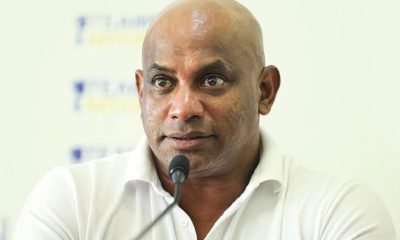
 Sports7 days ago
Sports7 days agoPathum will become world’s best batter, says Jayasuriya
-
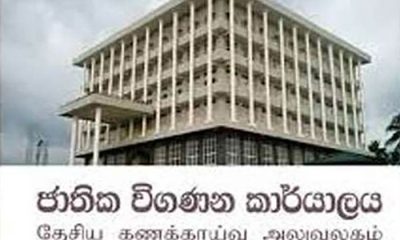
 News6 days ago
News6 days agoAbout 1,000 permits issued to SL migrant workers for electric vehicle imports misused
-
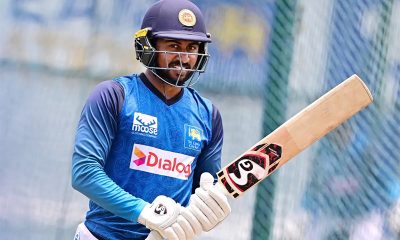
 Sports2 days ago
Sports2 days agoA lot at stake in Sri Lanka – South Africa Tests
-
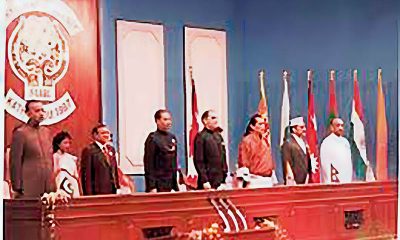
 Features5 days ago
Features5 days agoKathmandu 1987 and Islamabad 1988
-

 Business7 days ago
Business7 days agoDialog’s WOW Superapp Redefines Digital Lifestyle with Advanced User Experience
-
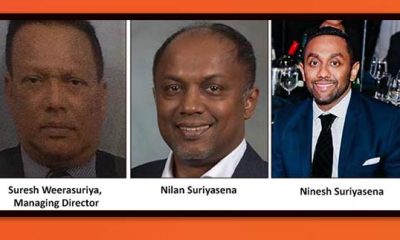
 News7 days ago
News7 days agoGoldi Sands celebrates its 50th anniversary
-

 Editorial7 days ago
Editorial7 days agoSign of capitulation
-
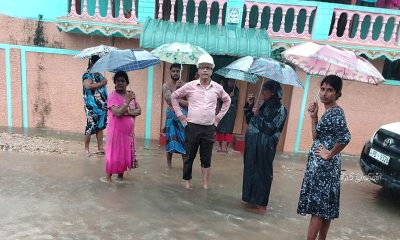
 News6 days ago
News6 days agoTorrential rains play havoc in Jaffna











